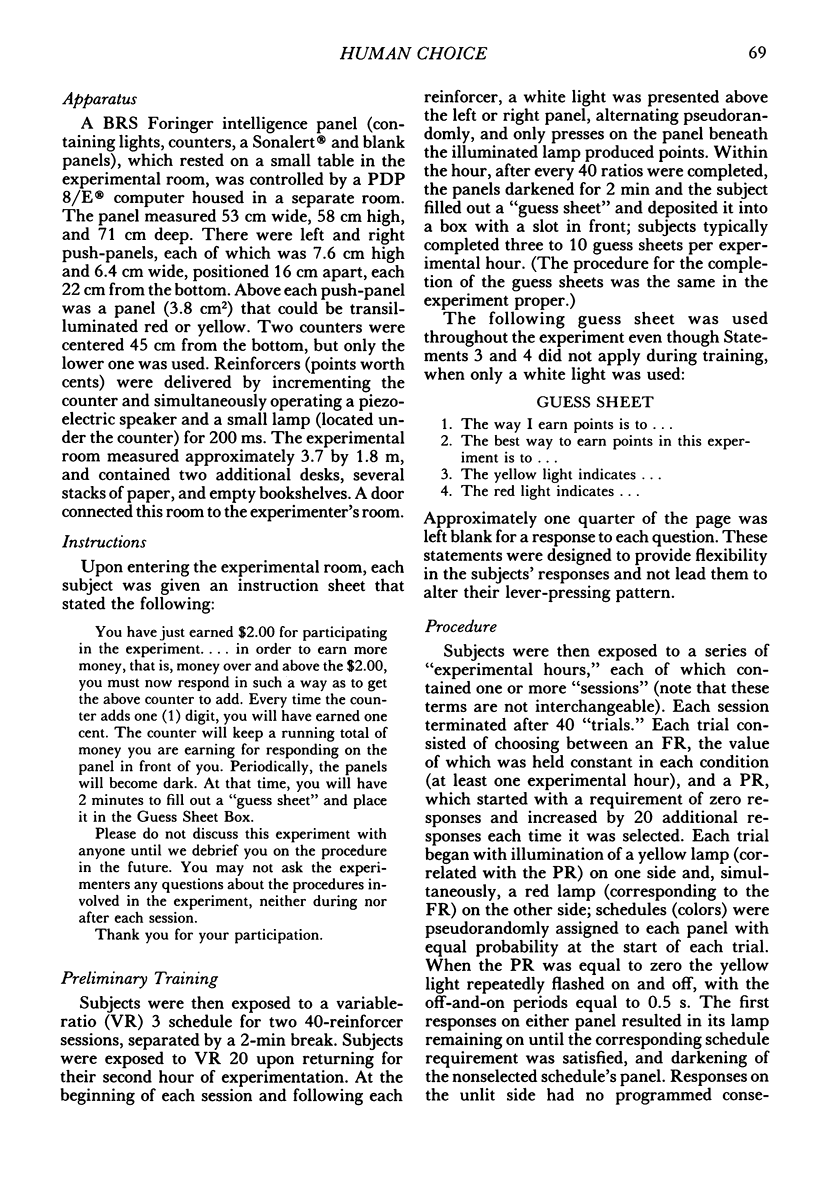Abstract
College undergraduates were given repeated opportunities to choose between a fixed-ratio and a progressive-ratio schedule of reinforcement. Completions of a progressive-ratio schedule produced points (exchangeable for money) and incremented that response requirement by 20 responses with each consecutive choice. In the reset condition, completion of a fixed ratio produced the same number of points and also reset the progressive ratio back to its initial value. In the no-reset condition, the progressive ratio continued to increase by increments of 20 throughout the session with each successive selection of this schedule, irrespective of fixed-ratio choices. Subjects' schedule choices were sensitive to parametric manipulations of the size of the fixed-ratio schedule and were consistent with predictions made on the basis of minimizing the number of responses emitted per point earned, which is a principle of most optimality theories. Also, the present results suggest that if data from human performances are to be compared with results for other species, humans should be exposed to schedules of reinforcement for long periods of time, as is commonly done with nonhuman subjects.
Full text
PDF


















Selected References
These references are in PubMed. This may not be the complete list of references from this article.
- Bernstein D. J., Michael R. L. The utility of verbal and behavioral assessments of value. J Exp Anal Behav. 1990 Nov;54(3):173–184. doi: 10.1901/jeab.1990.54-173. [DOI] [PMC free article] [PubMed] [Google Scholar]
- Critchfield T. S., Perone M. Verbal self-reports of delayed matching to sample by humans. J Exp Anal Behav. 1990 May;53(3):321–344. doi: 10.1901/jeab.1990.53-321. [DOI] [PMC free article] [PubMed] [Google Scholar]
- Hodos W., Trumbule G. H. Strategies of schedule preference in chimpanzees. J Exp Anal Behav. 1967 Nov;10(6):503–514. doi: 10.1901/jeab.1967.10-503. [DOI] [PMC free article] [PubMed] [Google Scholar]
- Mazur J. E., Vaughan W., Jr Molar optimization versus delayed reinforcement as explanations of choice between fixed-ratio and progressive-ratio schedules. J Exp Anal Behav. 1987 Sep;48(2):251–261. doi: 10.1901/jeab.1987.48-251. [DOI] [PMC free article] [PubMed] [Google Scholar]
- Mellitz M., Hineline P. N., Whitehouse W. G., Laurence M. T. Duration-reduction of avoidance sessions as negative reinforcement. J Exp Anal Behav. 1983 Jul;40(1):57–67. doi: 10.1901/jeab.1983.40-57. [DOI] [PMC free article] [PubMed] [Google Scholar]
- doi: 10.1901/jeab.1986.45-351. [DOI] [PMC free article] [Google Scholar]
- WEINER H. CONDITIONING HISTORY AND HUMAN FIXED-INTERVAL PERFORMANCE. J Exp Anal Behav. 1964 Sep;7:383–385. doi: 10.1901/jeab.1964.7-383. [DOI] [PMC free article] [PubMed] [Google Scholar]
- Wanchisen B. A., Tatham T. A., Hineline P. N. Pigeons' choices in situations of diminishing returns: fixed- versus progressive-ratio schedules. J Exp Anal Behav. 1988 Nov;50(3):375–394. doi: 10.1901/jeab.1988.50-375. [DOI] [PMC free article] [PubMed] [Google Scholar]
- Wanchisen B. A., Tatham T. A., Mooney S. E. Variable-ratio conditioning history produces high- and low-rate fixed-interval performance in rats. J Exp Anal Behav. 1989 Sep;52(2):167–179. doi: 10.1901/jeab.1989.52-167. [DOI] [PMC free article] [PubMed] [Google Scholar]


